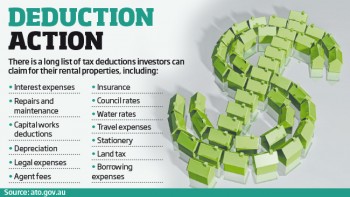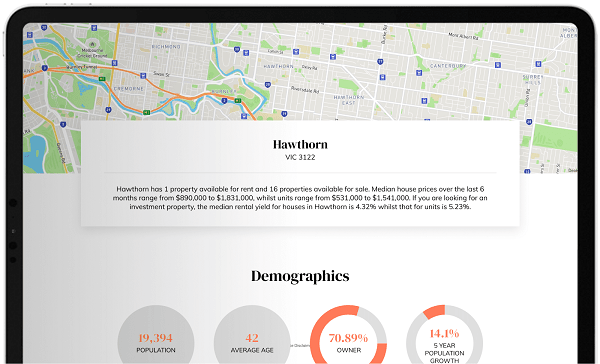Tax Deductions for Investment Property
Generally speaking investors purchase an investment property to generate an income and hope the property appreciates over time. The notion that a tenant pays you rent that in turn pays your loan is appealing to people.
However, with any investment there is always a certain amount of risk attached. One way to offset risk is to be aware of the tax deductions and benefits that are available to you.
The three main tax investment savings are.
- Tax deductions for many of the costs of owning a rental property
- The tax savings of negative gearing
- The availability of capital gains tax discounts

Let’s take a closer look at how each of these tax benefits can work for investors.
Investment Property Tax deductions
As a landlord you can normally claim a tax deduction for a wide range of the expenses related to your rental property including interest on the loan. It should be noted that these expenses can usually only be claimed if the property is tenanted or available for rent.
Your tax adviser can give you a clear picture of what you can claim for your personal circumstances. Though in general the following expenses can normally be claimed on tax:
- Advertising for tenants and property management fees.
- Loan interest and ongoing loan fees.
- Council rates, land tax and strata fees.
- Building depreciation plus depreciation of fittings and fixtures like stoves, carpets and hot water heaters. (A Depreciation Schedule prepared by an accredited Quantity Surveyor e.g. Mitchell Brandtman is required contact 03 9944 3030 or visit www.mitbrand.com)
- Repairs, maintenance, pest control and gardening.
- Building and landlord insurance.
- Stationery, phone costs and any travel to inspect the property.
- Accounting or bookkeeping fees.
- The above is not a full list of what you can claim. Always get proper advice from a tax expert before putting in your return.
Negative Gearing on Investment Property
You have probably heard the term ‘Negative gearing’. What does it mean? Negative gearing is when the costs of running your rental property exceed the return you are are receiving on the rent return. If this is your circumstance then you can offset this loss against your salary and other wages your receive. Fox example if your annual income is $70,000 and your rental property in losing you $15,000 annually then you will only need to pay tax on $55,000.
Obviously this is a tax saving on your personal income. Hopefully you will make up these losses with the property increasing in value over time.
NOTE: Capital expenses such as renovations or the repayment of your loan cannot be claimed as an ongoing tax deduction
The main advantage of negative gearing is that it makes a rental property much more affordable as the tax savings can be substantial.
Investment properties don’t have to be negatively geared. If the rent outweighs the costs of owning the property, it is said to be ‘positively geared’ and you can expect to pay tax on the profit the property generates each year.
Capital Gains Tax on Investment Property
Eventually there may arise a time when you have to or want to sell your investment property. If you make a profit on the sale then the tax man will say you have made a “capital gain”. And, the tax man will also say this gain is taxable. So, the profit will be added to your personal income the year you sell the property. You will then pay tax on the total amount. But there can be important capital gains tax concessions available to you as a property investor.
Firstly, the cost base used to calculate the capital gain includes the price you paid for the property plus buying and selling costs like legal fees, stamp duty and agent’s selling commission. All this can help you to reduce the profit for tax purposes.
Also, lets say you have had the property for over twelve months. You are now entitled to claim a 50% discount on the capital gain at tax time. Simply put, if you made a profit of $80,000 on the sale of the place but you have owned it for over one year, you will only pay tax on a profit of $40,000. This represents a significant saving of tax for investors and it offers a good incentive to own the property for the long term.


